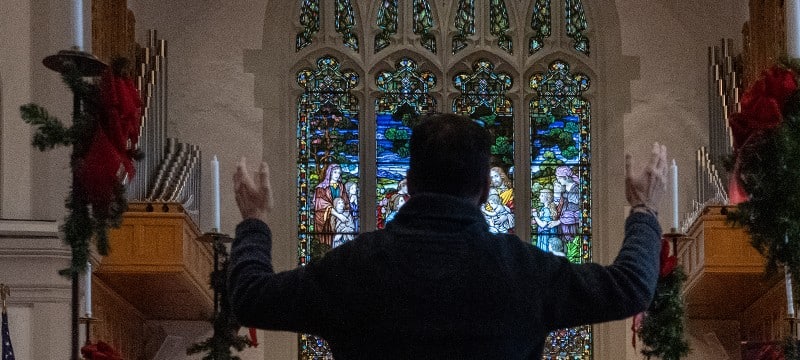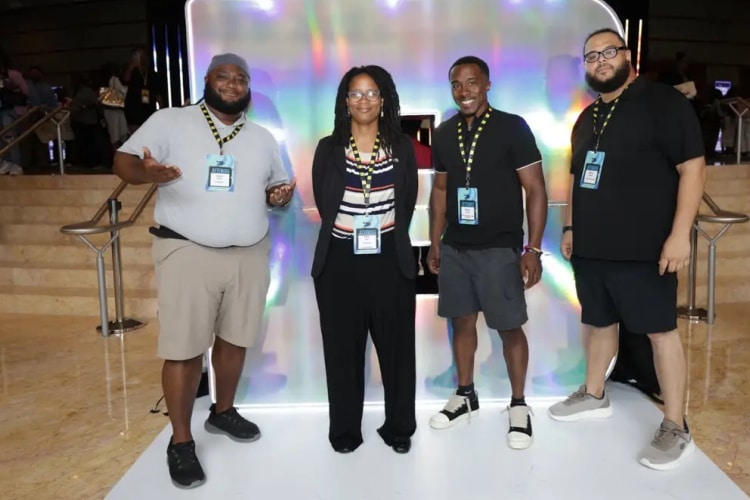Consider the Poor promotes empathy, respect
Sherman Bradley, CEO and founder of Consider the Poor, understands what it means to live in poverty. “I’m what you would consider the first generation to move from poverty,” Bradley says. “Both my parents grew up in poverty. My grandparents grew up in poverty. My great-grandparents were shipped off as slaves—so I understand a lot about what has been going on in our environment, in our country.” At the age of 5, Bradley and his parents, who put their money together from years of hard work and the assistance of the G.I. Bill, moved from inner-city Cincinnati to suburbia, which Bradley says enabled him to learn what was possible beyond what most of his family had experienced and been exposed to. Education and a desire to help others transition out of poverty led Bradley to community-based roles. For 10 years, he served as vice president of City Gospel Mission, where he oversaw components like the shelter and the recovery program; and in 2011, he started a business called Green Recycling Works, which enabled CGM to employ the men who graduated from its rehab program. “We prepare them to get back into society as viable tax-paying citizens, as opposed to individuals who find themselves on the wrong side of the law,” Bradley says. It was six years ago, however, and on the two-year anniversary of Hurricane Katrina, when Bradley traveled to New Orleans and experienced first-hand the conditions in which the poor were living. “I was able to learn information that was necessary to educate City Gospel Mission’s volunteer base on how to interact and really understand the poor,” Bradley says. “To build empathy and respect and give them meaning and value, then work with them toward transitioning out of whatever their particular situations are.” Bradley then founded Consider the Poor—an organization whose mission is to break the cycle of poverty by advocating, consulting, training and serving others. By hosting elementary and health education events like HopeFest and providing training to businesses and community action agencies, individuals—regardless of their economic situations—come together and see each other as community members, as people who look out for, and who care for, one another. “We want to educate organizations so that they can create cultures inside their programs, businesses or institutions that would offer people a greater opportunity to succeed,” Bradley says. “But in order to do that, we’ve got to understand where they’re at. Oftentimes, we want to take a lasso and pull them out of their city and put them in a suburban place and say, ‘Now fend for yourself,’ but there’s so much more involved in the process of transformation, and at the very root of it, it requires significant relationships with people who aren’t in that same class with them who can help teach them the hidden rules of the new environment that we’re asking them to succeed in.” Do Good: • Attend HopeFest on June 29 in Washington Park, and share the event with your friends. • Like Consider the Poor on Facebook, and encourage your business or organization to educate their staff and encourage a more welcoming environment for all individuals. • Contact Consider the Poor if you'd like to donate or volunteer, and take the time as an individual to learn more about those living in poverty. By Brittany York Brittany York is a professor of English composition at the University of Cincinnati and a teacher at the Regional Institute of Torah and Secular Studies. She also edits the For Good section of SoapboxMedia.
Sherman Bradley, CEO and founder of Consider the Poor, understands what it means to live in poverty.
“I’m what you would consider the first generation to move from poverty,” Bradley says. “Both my parents grew up in poverty. My grandparents grew up in poverty. My great-grandparents were shipped off as slaves—so I understand a lot about what has been going on in our environment, in our country.”
At the age of 5, Bradley and his parents, who put their money together from years of hard work and the assistance of the G.I. Bill, moved from inner-city Cincinnati to suburbia, which Bradley says enabled him to learn what was possible beyond what most of his family had experienced and been exposed to.
Education and a desire to help others transition out of poverty led Bradley to community-based roles.
For 10 years, he served as vice president of City Gospel Mission, where he oversaw components like the shelter and the recovery program; and in 2011, he started a business called Green Recycling Works, which enabled CGM to employ the men who graduated from its rehab program.
“We prepare them to get back into society as viable tax-paying citizens, as opposed to individuals who find themselves on the wrong side of the law,” Bradley says.
It was six years ago, however, and on the two-year anniversary of Hurricane Katrina, when Bradley traveled to New Orleans and experienced first-hand the conditions in which the poor were living.
“I was able to learn information that was necessary to educate City Gospel Mission’s volunteer base on how to interact and really understand the poor,” Bradley says. “To build empathy and respect and give them meaning and value, then work with them toward transitioning out of whatever their particular situations are.”
Bradley then founded Consider the Poor—an organization whose mission is to break the cycle of poverty by advocating, consulting, training and serving others.
By hosting elementary and health education events like HopeFest and providing training to businesses and community action agencies, individuals—regardless of their economic situations—come together and see each other as community members, as people who look out for, and who care for, one another.
“We want to educate organizations so that they can create cultures inside their programs, businesses or institutions that would offer people a greater opportunity to succeed,” Bradley says. “But in order to do that, we’ve got to understand where they’re at. Oftentimes, we want to take a lasso and pull them out of their city and put them in a suburban place and say, ‘Now fend for yourself,’ but there’s so much more involved in the process of transformation, and at the very root of it, it requires significant relationships with people who aren’t in that same class with them who can help teach them the hidden rules of the new environment that we’re asking them to succeed in.”
• Attend HopeFest on June 29 in Washington Park, and share the event with your friends.
• Like Consider the Poor on Facebook, and encourage your business or organization to educate their staff and encourage a more welcoming environment for all individuals.
• Contact Consider the Poor if you’d like to donate or volunteer, and take the time as an individual to learn more about those living in poverty.
By Brittany York
Brittany York is a professor of English composition at the University of Cincinnati and a teacher at the Regional Institute of Torah and Secular Studies. She also edits the For Good section of SoapboxMedia.















